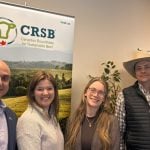
Tag Archives Les Henry

Schoenau receives inaugural Les Henry Award
The late Les Henry announced the award’s first recipient earlier this year

Editor’s Rant: Thanks, Les

Where the canola was: a history of Saskatchewan yields by soil climatic zone
Whether by nature, nurture or both, yields jumped in several zones around the turn of this century

Prairie soil scientist and author Les Henry, 83
Henry's outreach to farmers spanned more than half a century

Soil scientist and Grainews columnist Les Henry, 1940-2024
Henry's outreach to farmers spanned more than half a century

The legacy of Henry’s Handbook
A book well known to Grainews readers will remain available

Zero till: how did it all happen?
Soils & Crops: In Saskatchewan, necessity was the mother of more than one invention

Water chemistry: a Coles Notes version
Soils & Crops: Conductivity and hardness of water samples show what you can use it for

Nitrate down the well
Soils & Crops: If you move onto an old farmyard with an existing well, don’t drink the water without first getting it tested

A climate update for our neck of the woods
You'll want to keep your long underwear handy for the next several winters


